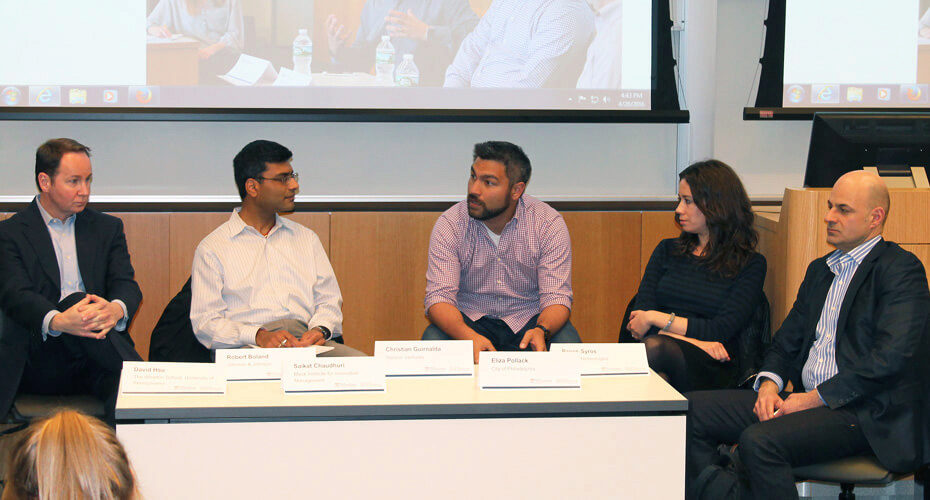A guest post by MIDAs co-founder Andrea Contigiani
The Mack Innovation Doctoral Association (MIDAs) recently hosted our second industry-academia panel, this time focusing on recent trends in organizing for innovation and featuring perspectives from local government, Wharton faculty, Mack Institute corporate partners. (Read about our first panel on the financing of innovation here.)

Our goal was to understand emerging trends in how firms create innovation, both inside and outside their boundaries. So we covered a variety of topics, from incentives to acquisitions, from corporate venture capital to open innovation.
We started with incentives, a topic which many MIDAs members research. It was interesting how the panelists confirmed that their organizations rely heavily on various forms of nonfinancial incentives, a recommendation that researchers in the management field have been making for a long time.
We often hear that collaboration is a key ingredient for innovation, and that came up in the panel too. It was exciting to hear from the perspective of a governmental organization, which, as you may expect, is really a different world. Eliza Pollack, Program Manager for Innovation Management, City of Philadelphia, talked about how critically difficult it is to get different departments of a large old-fashioned organization, such as a city, to work together. How to enable efficient collaboration is an old but still very much open and exciting research question.
We then moved to speaking about how firms increasingly need to seek ideas outside the organization. Christian Guirnalda, Director of Product and New Business at Verizon Ventures, gave a simple and powerful explanation about this growing trend. In many markets, due to some of the recent technological waves, speed of change is increasing substantially. To keep up with that, firms can no longer keep innovation inside; they need to go outside.
Saikat Chaudhuri, the Mack Institute’s Executive Director, spoke about one important way to obtain external knowledge: acquisitions. Researchers know that acquisitions rarely work, but we don’t yet really know why. It turns out that acquisitions are really not a good way to buy real options. Instead, acquisitions tend to be more effective when they contribute to building an ecosystem. So, ecosystem thinking is what matters for companies trying to make decisions about acquisitions, and for researchers studying the way companies behave and perform in that domain.
Finally, we had a long and exciting conversation about corporate venture capital. It’s a growing phenomenon many of us are seeking to understand, especially in management and in finance. Guirnalda told us about his experience at Verizon Ventures, where they use CVC primarily to learn about new markets. That’s different from what other large companies’ VC arms, which invest primarily with the goal of expanding their ecosystem. Interestingly, he said that CVC investments don’t really increase the probability that the target venture will get acquired. Instead, CVC often leads to some form of partnership.
So, again, we had an exciting day talking about the research and practice of innovation. This was also the last event of MIDA’s first academic year. It was indeed an inspiring year, and we look forward to starting again with lots of new ideas this coming fall!
Interested in participating in MIDAs? Learn more and contact the organizers here.
About the Author
 Andrea Contigiani is a PhD student in Management at The Wharton School, where he is specializing in Entrepreneurship and Strategy. He received a BS in Business Administration from LUISS, a MS in Economics and Social Science from Universita’ Bocconi, and a MA in Economics from the University of Pennsylvania. Before starting the PhD program, he was a researcher at Wharton Entrepreneurship. His research explores a variety of elements of the innovation process: from individual motivation to organizational structure, from strategic decision-making to intellectual property regulation. He uses primarily experimental methods, both in the lab and in the field. His dissertation investigates drivers and effects of strategic experimentation, a key strategic choice for both new ventures and mature firms.
Andrea Contigiani is a PhD student in Management at The Wharton School, where he is specializing in Entrepreneurship and Strategy. He received a BS in Business Administration from LUISS, a MS in Economics and Social Science from Universita’ Bocconi, and a MA in Economics from the University of Pennsylvania. Before starting the PhD program, he was a researcher at Wharton Entrepreneurship. His research explores a variety of elements of the innovation process: from individual motivation to organizational structure, from strategic decision-making to intellectual property regulation. He uses primarily experimental methods, both in the lab and in the field. His dissertation investigates drivers and effects of strategic experimentation, a key strategic choice for both new ventures and mature firms.



